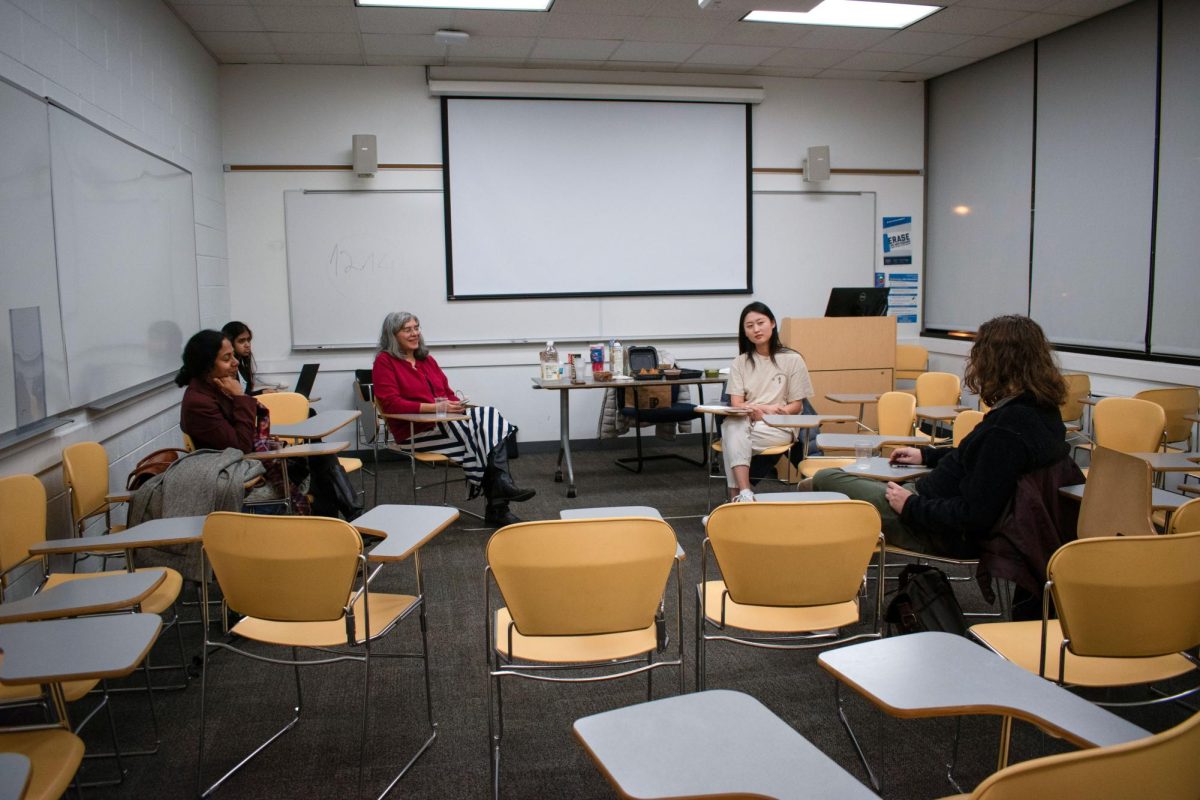Miss Americana and Queen Bey have masterminded their way into the global spotlight, and students and professors delved into the varying discography and public perceptions of the two artists at Phillips Hall Friday.
First-year student Thomas Morningstar, Zhangzhu Wan — who is pursuing a Master of Arts in Public Policy — and Women’s, Gender, and Sexuality Studies professor and director Ashwini Tambe discussed Taylor Swift’s and Beyoncé’s contributions to feminism and appeals to LGBTQ+ audiences. The discussion is the latest installment of the WGSS program’s Pop Culture Tea Time series.
Wan, who grew up in China, said Beyoncé is positively perceived in the country but Taylor Swift holds a very negative reputation, although it has improved in recent years as more Chinese women embrace feminism.
“When it comes to sex and relationships, the general Chinese culture tends to be a little more conservative if we use the Western standards to look at it,” Wan said. “So, all of her boyfriends and writing music on them was not perceived well in China.”
Wan said Swift’s negative image in China has led many people to refer to her derogatorily as a “bus” because everyone can “get on” her, while her fans are referred to as “emissions” because they devotedly follow her.
Tambe said Beyoncé’s 2022 album “Renaissance” portrayed her breaking free from societal expectations for women to act in a reserved and respectable manner. She said Beyoncé’s performances are much more “risky” than her earlier, more “dignified” performances.
Wan said Swift is the face of white feminism, an expression referring to a form of feminism that prioritizes white women. Wan said she is worried that Swift’s immense influence and large fanbase — many of which she says are young, white feminists — might further the belief that white feminism is the “center” of feminism and detract from the complexity of issues plaguing women of color.
Morningstar said Swift’s song “The Man” portrays her attempt to assimilate into patriarchal society instead of trying to “combat” the structure. They said Beyoncé, however, tries to be “her own self” and asserts her femininity.
The group pivoted to unpack Beyoncé and Swift’s popularity among LGBTQ+ audiences, which they say comprises a significant portion of their fanbases.
Wan said Swift began showing her support for the LGBTQ+ community in her 2019 album “Lover” and many consider her song “Betty” from her album “Folklore” to be Swift’s gay confession to the song’s subject, even though Swift said she wrote the song from a fictional persona.
Morningstar said much of Swift’s work could be considered queerbaiting — alluding to being part of the LGBTQ+ community when she is not — simply to gain more popularity. Morningstar said this could take attention away from LGBTQ+ artists.
“When you have the power, as I’ve said, you can very much easily take over the conversation, it can very much become just her voice,” Morningstar said.
Tambe said Swift and Beyoncé have amassed strong influence among queer audiences for years. She said Beyoncé “directly” appealed to queer audiences for the first time in “Renaissance” by paying “homage” to house music — a genre that originated in queer clubs in the 1970s and 80s — which Tambe said is a “refuge” for marginalized people.
The group also debated the contrasting scope of the two artists’ music and their writing styles.
Morningstar said while Swift focuses more on “heartbreak” and “emotion” in her discography, Beyoncé’s music focuses on “liberation” from the struggles she faces in her life, citing her 2016 album “Lemonade” where she aired grievances about her marriage to rapper Jay-Z. Morningstar said they find it “interesting” that Swift consistently writes about her relationships instead of “promoting other aspects of her own self worth.”
Wan said Swift focuses on her personal experiences because she knows her emotional songs are more popular among her fans.
Wan said glorifying and contributing “aesthetic” to depression is a central part of Generation Z culture, and that Swift’s music is sad in a way many young people are able to resonate with, which lends to her popularity.
Tambe said Swift is a “confessional” songwriter because most of her songs draw from personal experiences. She said Beyoncé also exercises this method of songwriting, as seen in “Lemonade.”
“There’s something very specific about these two artists and the devotion that they inspire,” Tambe said.










